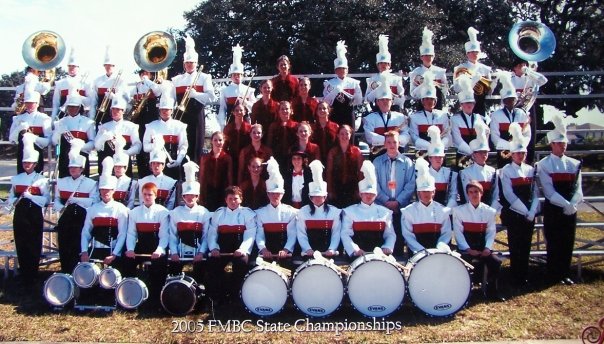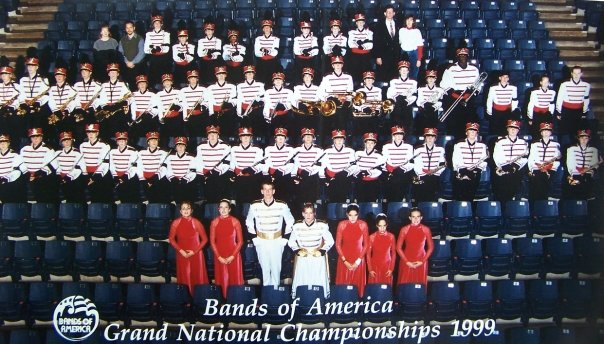

When I decided to become a band director, I never saw myself directing small bands. But, for 35+ years, that is what I have been doing. Directing small bands requires a shift in thinking and approach for the director. This post will look at four B’s to improve your small band directing.
Be yourself
It’s important to remember who you are. You are a small band. If you see yourself through the lens of a large band, you will make bad choices. There are things that the bigger bands do that you cannot do.
You can’t be as loud as a big band. If you try to get anywhere near their volume, you will sound terrible. Not only will you sound terrible, your kid’s entire approach to the instrument will suffer. They will push like they’re trying to blow an elephant through a straw. This will create tension in their shoulders, neck and face which might make them sound like an elephant.
Don’t play the same music as a big band. I spent years in denial with my music choices. I picked music that I liked which was written for two to three times the number of musicians that were in my band. If you are looking at music for a competition band and you see long fortissimo sections… that’s written for a bigger band.
According to Brittanican.com there are 17 different weight classes in boxing. A lightweight fighter doesn’t box a heavyweight fighter. If you watch a fight from different classes, you’ll see that they fight differently. Here is a link for a flyweight fight and here is one for a heavyweight fight. The heavyweights pack a heavier punch while the flyweights are quicker. Find music that will allow you to show off articulation or maybe something that has instrumentation with parts that are doubled.
There is music written for smaller bands. Give this music a good look. Fight in your own class!
Be realistic
This is almost the same thing as what I’ve written above, but I want to make a few distinctions.
When I was in a large band with 20+ trumpets, we could tag team parts. During graduation, I could take a few measures off and blow out my chops while the other 19 kept playing. This isn’t an option if you are the only trumpet. Keep this in mind. Can your players physically make it through the performance you’re planning?
We have concerts that are a combination of multiple ensembles. It isn’t uncommon to have someone playing in two different groups. Specifically, someone might be in concert band and jazz band. When you make up the program, take a moment and consider if your musicians have the physical ability to do both sets. Again, be realistic!
Be personal
My first band had one trumpet in the marching band, no tuba, etc. Very small. It didn’t take very long to know everyone’s name. I could get into the heads of all of the kids. This was a massive shift in approach me, and I found that it was a great advantage.
I worked hard to get my director’s attention in high school. But, when you are one of 20 trumpets in a band of around 100, the director has a lot on their mind. As a director of small bands I leverage this to my advantage. I strive to motivate at a more personal level. How many directors of large bands have strong, almost personal connections with their entire band?
I’m not saying that my director didn’t care about me and I’m not saying that larger bands have directors that are aloof. What I am saying is that there is only so much one person can do. A director of large bands can’t spend all day with their office door open talking to kids and trying to get to know all of them. Directing small bands is an entirely different experience. You can talk to pretty much everyone.
Be happy
This one comes from a great friend of mine. We went to school together and started directing at about the same time. He had a larger band and I had a smaller band. I struggled a great deal because I had dreams and goals that I wanted to accomplish and those things would require at least 3 trumpets and a couple of tubas (which I didn’t have).
I was talking to him after an event and I was not happy. He listened patiently and then asked me these questions, and I offer them to all band directors regardless of the size of your group:
- Are the kids happy?
- Are the parents happy?
- Are the bosses happy?
I answered yes to these questions. His reply was, “You should be happy.”.
He wasn’t telling me to lower my standards. It’s ok to keep pressing for improvements, but at the end of the day, what are we doing with these kids? Are they here to feed our egos and desires to be “somebody”? Isn’t the idea, that the kids learn to perform and enjoy the process. If parents and administrators watch and are proud of the kid’s performance, shouldn’t we be happy as well?
Be yourself, be realistic, be personal and be happy that you have this opportunity to work these kids. And, don’t be in a big hurry to leave your small school for the big school down the road. You might, like me, find that you are proud of your smaller bands and the things they accomplish.

One response to “Directing small bands”
[…] Below is our performance of the 1990 LCA Band at the James Madison University Parade of Champions. You can read some of my reflections on being a small band director here. […]